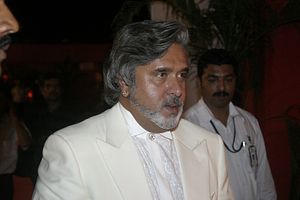Shortly after the conclusion of the Indian Premier League (IPL) cricket matches of 2013, the Board of Control for Cricket in India (BCCI) chairman, Lalit Modi, was accused of misconduct through financial irregularities, and proceedings were initiated against him on these grounds. Modi moved to London shortly before the Enforcement Directorate began investigating these allegations. In March 2011, his passport was revoked, in an attempt to have him deported to India in order to ensure his physical presence in the trial process. However, the revocation of his passport did not invalidate his right to stay in the UK – since he entered with a passport that allowed him to remain the country.
This situation seems to be repeating itself in the case of Indian businessman and former politician, Vijay Mallya – a well known alcohol and airline magnate. Due to a report filed with the Central Bureau of Investigation (CBI) regarding his default on a loan of 900 crore rupees (about $134 million) from Indian state-owned bank IDBI, proceedings were initiated against him. Soon after, several ex-employees of his company, Kingfisher Airlines, which has been grounded since October 2012, aired public allegations of being denied remuneration and service benefits. Public wrath against Mallya soared further on the revelation of his offshore holdings through the Panama Papers – especially since Mallya currently has defaulted on loans worth over 9000 crore rupees (about $1.4 billion) from a consortium of 17 banks, led by the State Bank of India.
On February 25 this year, Mallya signed what is known as the Diageo Deal, an agreement that allows him a payoff of 515 crores rupees ($75 million) and a property deal, in return for stepping down as non-executive Chairman of United Spirits. A closer look at the deal reveals a whole can of worms, since it absolves Mallya of claims over fund diversion between United Spirits and other United Breweries Group firms. As part of his case proceedings, the Debt Recovery Tribunal (DRT) banned him from withdrawing the portion of his payoff that had already been credited (around $40 million) until the conclusion of the case.
However, more directly linked to the question of why it has been so hard to take action against Mallya is his departure from India to the United Kingdom on March 2. The Enforcement Directorate (ED) placed a summons before Mallya for March 18, yet he cited prior engagements and requested a move to April. While the possibility that he sent money abroad illegally continues to be investigated, his proposal to settle at less than the full amount (first at 4,000 crore rupees, then at approximately 6,860 crore rupees) of over 9000 crore rupees has been rejected by the lenders as well as the court. He subsequently missed two more summons from the ED and the Ministry of External Affairs (MEA) revoked his passport. In addition, the government issued a non-bailable arrest warrant in his name and further sent a deportation request. This was denied on grounds similar to Modi’s, granting Mallya an asylum of sorts in his home in Ladywalk, London.
While Mallya, who was a member of the Rajya Sabha (the Upper House of the Indian Parliament), resigned in the wake of the Ethics Panel’s decision to recommend his expulsion, he continues to insist that the whole issue has been blown out of proportion – citing the over-valuation of his debts as well as political conspiracies. He has gone onto express a willingness to return to India, but says that he fears threats to his safety. Perhaps, he assumes that this alone would be adequate to compensate for his early escape as well as consistent disrespect for the ED’s summons.
Legal authorities in India have escalated procedures to bring him to justice. They have exhausted all existing legal options and put in place the last ones. The DRT withheld the dividend payout of his 32.45 percent stake in United Breweries Limited. To bring him to justice under the Prevention of Money Laundering Act (PMLA), his assets are being evaluated. There is a plan by the ED to potentially freeze his shares and a Red Corner Notice (RCN) has been sent out to the Interpol wing of the CBI (issued to seek location and arrest), and the process towards extradition has begun.
However, it remains to be seen whether anything will come of the extradition process. Earlier this March, permission was granted to extradite Lalit Modi as well though as of this writing no significant action has been taken to further the process. The process for extraditing Mallya is likely to be just as complicated; his defaults and apparent non-compliance with the ED strengthen the case against him, but his declaration to settle does shake things up. While the ED, his lenders, the courts and the MEA ponder this conundrum, Mallya tweets away from London about cricket.

































